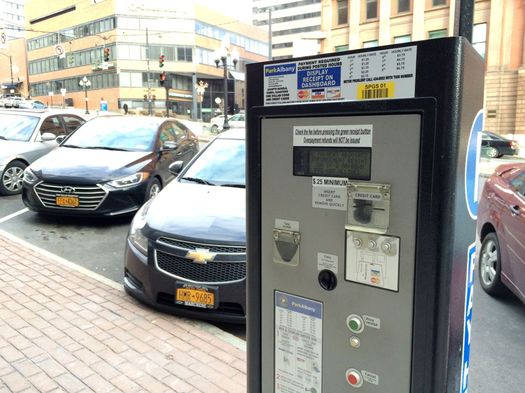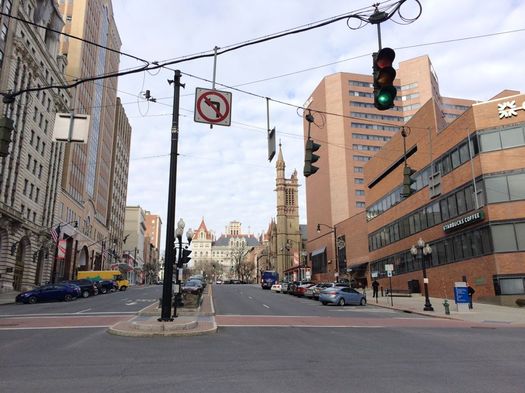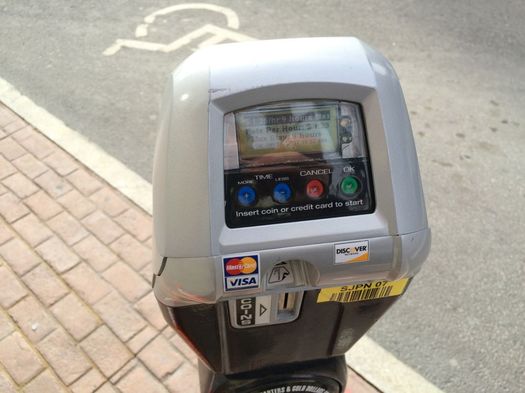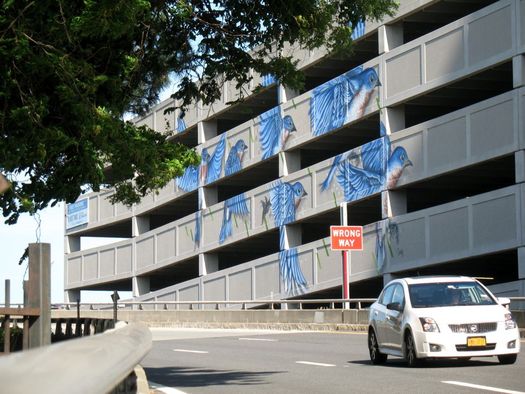Just down the road for Albany: paying for parking by license plate and mobile app

One of the current pay-and-display meters.
Mobile phones are re-centering the way we look at the world, becoming our primary connection to all sorts of aspects of our everyday lives: friends and family, shopping, media, transportation and... parking*.
The Albany Parking Authority is currently sorting through potential vendors for a new system that would allow people to pay for metered parking via mobile app.
It's been almost six years since the city installed its first "pay-and-display" meters downtown -- at which people can buy parking time and get a ticket to display on the dashboard of their vehicle -- moving away from the old-school, single-space "lollipop" meters.
Parking authority executive director Matt Peter says those pay-and-display boxes are approaching the end of their typical lifespan. And in the last few years, parking tech has evolved toward systems that swap out the dashboard display ticket for setups in which people either buy time by a specific parking spot or by their license plate number.
"Most cities, in general, are either going to a pay-by-spot or pay-by-plate mentality," said Peter, pointing to recent examples such as New York City and New Haven, Connecticut (which has competing mobile apps). "You go to most cities it's currently the norm that at least some parts of it have the parking app. It's rapidly expanding and it's sort of the technology right now."
Cities in the Northeast have tended to favor pay-by-plate, he said, because the complications snow can introduce for people trying to figure out the ID of a certain spot.

So here's how such system would work more or less:
+ You park your car in an open space.
+ You head over to a nearby meter box -- like the pay-and-display boxes -- to enter your license plate number and buy the amount of time you want. OR
+ You use a mobile app on your phone to buy the time -- and if, need be, you'd be able to buy more time later without returning to the vehicle, again via the app. There would be a small additional transaction fee for using the mobile app.
"Giving them the mobility option with the pay by phone means if someone is stuck in an office in a meeting and they're running 10 minutes late, instead of risking a ticket that's, you know, $45-$60, you upload it, and for whatever that transaction fee is, can just pay the meter," said Peter. "Whether it's 15, 20 cents per transaction no matter how much you put on, it's a good option. And I think it's convenient."
As with pay-and-display, the pay-by-plate system would also allow people to move to a different spot within the same zone without buying new time. (The city has different parking rates depending on zone -- with rates higher where there's more demand -- which is why people wouldn't be able to just move wherever.)
The mobile app would also allow Park Albany to push out information about free parking or emergency parking restrictions.
Park Albany issued a request for proposals to vendors last fall. It's currently sorting through a pool of seven meter companies and five mobile app companies. (The companies have configuration agreements so both sides of the new setup should be able to work together.)
Peter said the authority is aiming to select vendors in February and March and have a pilot program on State Street between Eagle and Broadway up and running sometime in the spring. He said they'll be looking for feedback during the pilot.
"If there's problems, we want to know that in the small test area before we go city wide. There's a big difference between 12 meters and a hundred spots and 152 meters. So we want to make sure we get it right."
A few more bits about parking meters

One of the credit card "lollipop" meters.
While we're on the topic of parking meters...
+ Matt Peter said the pay-and-display boxes cost about $8,000 each and cover 10-12 parking spots. The cost is one of the reasons the city hasn't rolled them out everywhere -- and isn't necessarily planning to in the future -- because the payback on a box isn't there if it's only covering a few spaces or the spaces don't get used often. Another complication for the boxes: There has to be available space to mount them in a way so they're accessible.
+ The old-school coin "lollipop" meters are about $300-$400 each, though they their own drawbacks. They only cover one space and they have to be emptied. But as Peter noted, they have a long life span.
+ Park Albany has been testing lollipop meters that take credit cards in the area of State and Pearl downtown. They cost about $500 each and they also require a $5-$6 per month charge to the authority for back-office software each month. The APA also pays a transaction fee when people swipe their cards.
Looking to the future downtown and in the Warehouse District

The Quackenbush Garage
The Albany Parking Authority is also currently in the process of selecting a planning and/or engineering firm to study parking demand -- both current and future -- in the Warehouse District and the downtown core.
For the Warehouse District, Peter said the authority wants to get an idea of whether some sort of new parking infrastructure will eventually be needed to serve growing demand as the neighborhood shifts from its light industrial roots to more mixed use. "It could be nothing, could be lots, it could be a garage -- we don't know. That's fundamentally the point of that [study]."
Downtown the authority already has three parking garages. Peter said the Green-Hudson and Riverfront garages are currently at capacity. And the Quackenbush Garage is at 50-60 percent capacity, though that could change quickly with new development at Quackenbush Square or the planned Palace expansion.
"We're seeing more and more residential conversions, more and more demand downtown," he said. "So we want to make sure none of that is stalled because of a lack of parking. And so we want to make sure we're ahead of that curve as much as we can be and supporting that growth. So we want to see, again, is there future demand, do we need to consider another garage, do we need to consider more lots, what do we need to do?"
The choice of whether to build a new garage is big one, not just because of the size of the structure -- but also because the cost is huge. Peter said it costs about $28,000 per space for a garage in the 800-space range (that's about $22 million total), though the overall cost can vary a bit depending on how much it costs to acquire the land.
"We will not make an investment that puts us at risk or puts our bondholders at risk. We have a fiduciary responsibility for that," he said. "But that doesn't mean that we're not willing to make sound investments on behalf of the city and the downtown and making sure we're part of that solution. But we have to be sure."
____
* Because it always comes back to parking.
Hi there. Comments have been closed for this item. Still have something to say? Contact us.
Comments
"There would be a small additional transaction fee for using the mobile app." - Why the additional fee? Both the kiosk and the mobile app would use the same REST endpoint (or other backend). Is this due to the transaction having to go through the app stores? It shouldn't have to as it is the purchase of a physical object which is a rectangle of space for a designated period of time.
... said Tim on Jan 20, 2017 at 8:37 AM | link
Why not make parking free?
... said Ron on Jan 20, 2017 at 1:07 PM | link
@Ron - see here: http://freakonomics.com/podcast/parking-is-hell-a-new-freakonomics-radio-podcast/
... said Ed on Jan 20, 2017 at 2:51 PM | link
"is there future demand"
Not surprising that the head of the parking authority wants to build anticipatory garages based on predictions of future demand when we already have garages that aren't at capacity. More parking infrastructure induces demand and continues taking our city in an unsustainable direction.
... said Mike on Jan 20, 2017 at 3:45 PM | link